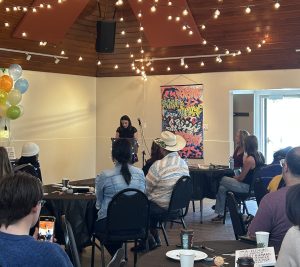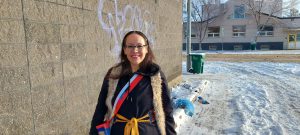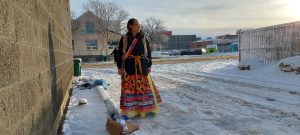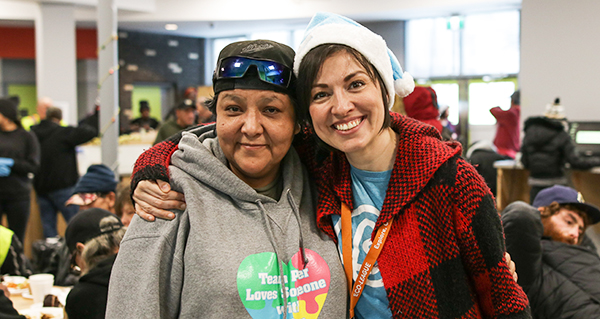When Emcee Construction began renovating our Community Space, it wasn’t necessarily looking to fill in some frontline and entry-level roles on the construction team. But after learning about the Workforce Development program, Construction Manager Corey Wong immediately saw advantages to partnering with this program for recruiting construction workers.
“The process was very easy,” says Wong. “The candidate interviews went very well, and they started right away. Once on-site, they took to the construction environment very quickly.”
Partnering with Workforce Development adds a personalized advantage to recruiting for multiple industries, including construction. We look deeper into each individual’s goals, strengths, talents, and interests to place them in work environments where they will flourish.
Ready to Start Work from Day One
Wong notes that a huge driver for his recruiting through Workforce Development is that candidates are typically already trained and certified – so that’s less time he needs to spend on training and explaining the construction environment.
“Because of the courses taken while in the program, they get a clear idea of what they want to do, and we don’t end up with someone who, once on the job, decides they don’t want to be there, and that’s just lost time for all involved,” says Wong. “The program creates realistic expectations for the worker and, by getting them access to the certifications that will be required by the employer, they then become very attractive as new hires.”
Certifications that program participants gain through Workforce Development can include construction safety, First Aid and CPR, forklift operations, and more. Because the program participants guide much of their own development, they can work on the goals that are relevant to them – giving program workers the opportunity to find and help individuals through their certifications.

Providing an Opportunity to Excel where it’s Needed Most
On top of all the certifications and other advantages to recruiting construction workers with Workforce Development, Wong fully recognizes how this program helps people not only get back to work – but find work that’s meaningful for them and allows them to excel.
“Because we are a smaller construction company, we have few opportunities for hiring,” says Wong. “To be able to give that opportunity to someone who has in the past struggled to find work, is very gratifying. I remember what it was like when I was young and wanted to get into the construction field with no experience. It can be quite difficult. Our new worker is committed. And once you have good workers you can rely on, you can just concentrate on the work.”
Our Workforce Development program is looking for new employer partners – including ones in the construction, warehousing, and manufacturing industries. Discover how partnering with Workforce Development could help you and your business thrive. Because everyone deserves work that allows them to shine.
Individuals connected to our Fetal Alcohol Spectrum of Services (FASS) program contributed to a book about the challenges and realities of navigating life with Fetal Alcohol Spectrum Disorder (FASD). Under the guidance of Jared Epp, Carleton University PhD candidate and former housing support worker with Bissell Centre, who facilitated the group in sharing stories of what was most important to them. Fifteen people shared their stories, captured in this captivating collection. Born Broken is a book that’s an immersive experience into what it means to have FASD and the barriers it can create.

The group celebrated the release of this Born Broken book this past month with a small and intimate reading and sharing. Everyone who contributed to the book received a copy, and a few were shared around the community to help spread its positive message.
Copies of Born Broken books are available to purchase from the Bissell Thrift Shop on 118 Avenue..
Below is the preface to the book, written by Jared Epp. This firsthand experience of seeing the collection come together illuminated the importance of this book for the contributors and for those about to read it and gain a better understanding of FASD.

Preface from Born Broken
A group of individuals connected to Bissell Centre’s Fetal Alcohol Spectrum of Services (FASS) came together for a book project. The goal was to provide an opportunity for folks to share whatever kind of content they wanted. Leaving it open-ended allowed the individuals participating in the project to share what was meaningful to them. Their contributions didn’t have to only be about living with Fetal Alcohol Spectrum Disorder (FASD). A number of contributors did want to share their stories about living with FAD, about their daily challenges, as well as the impact of receiving their diagnosis. Others talked about different things. There are stories about adventure on Edmonton’s public transit, sewing denim, dreaming, making music and art, the challenges of finding and keeping a job and many other events and situations the reader will soon encounter.
Woven throughout the book are stories, ideas, frustrations, thoughts and reflections, offering a window into the experience of entering into the world a certain way.
In our last group meeting, we had to come up with a title for the book. Each contributor present was invited to come up with some titles, and then there would be a vote.
These were the title ideas:
- Born Broken
- The Struggle is Real
- Drumbeats of Hope
- Light in the Dark
- Perfectly Imperfect
- Getting Dealt a Bad Hand
Everyone had agreed on Heidi’s subtitle, “Reflections on Life and Resiliency from Individuals living with FASD,” as it put a positive spin on the main title.
Born Broken won by one vote over The Struggle is Real and Light in the Dark. There was a lot of discussion and debate on the chosen title. Some people felt it was too negative, but they also acknowledged it’s sentiment. In many ways, the titles and the debate around it set a theme that echoes through each story: individuals confronting and overcoming something they were born with, have no control over, and yet seems invisible to those outside the lived experience of FASD. The reader is invited to encounter the diverse contributions within the book, keeping in mind the unsettled nature of its title and the realities of living with FASD.
-Jared Epp

Michelle’s Story About Overcoming Poverty
This is Michelle. She grew up in Edmonton. Whenever Michelle returns to Edmonton, she sits on the curb next to Bissell Centre’s community space. “This is where she sat,” Michelle says. “And I feel like she’s still here. I tell her that I love her whenever I sit here.”
Michelle’s mom regularly visited Bissell Centre, requiring services from drop-in supports to the housing program. “My mom was a residential school survivor, she became addicted to alcohol and drugs over the years. She was the most loving, kind mom before that.”
She sits on the curb, lights the sage in a small cast iron skillet and places her headphones into her ears. She takes a long breath and starts talking to her mom about overcoming poverty. She tells her how she’s taking care of the babies, getting her degree, and working in corporate now – that she’s doing really good.
When Michelle says she’s doing really good, this carries a very heavy weight. This means she’s helping her children heal, providing for her family, and moving forward away from the cycle of poverty she knew. She’s breaking Intergenerational trauma and overcoming systemic oppression. And she’s able to give back.
Another breath and she begins singing. Not starting with a whisper, but right from the bottom of her feet, out her mouth, and reverberating across 96 Street. Wandering up and down the alleyway where her mother passed away, she releases every emotion in her being with every word she sings.

Where Michelle is today
Today, Michelle is a social worker with a background in childcare and Indigenous culture. She now lives in central Alberta. She is part of an Alberta Health Services advisory council, where she regularly attends meetings to help offer better services to all Albertans.
Overcoming poverty was not an easy path. Growing up in poverty and with parents experiencing addiction meant she had to work four times as hard to get where she is today. Michelle was able to find a path that was healthier and more fulfilling for her and her family.
Michelle’s Journey to Bissell
As a child, Michelle (along with her mother and three siblings) left their northern Alberta community to escape toxic family dynamics and domestic violence. The family travelled to Edmonton for a better life. But both of her parents quickly experienced addictions, and it wasn’t long before Michelle’s mother found herself living in Edmonton without shelter.
After she became a parent, Michelle came to Bissell Centre for some basic needs, the child care program, and the parent program. This is where she met childcare worker Fatima and family supports worker Cheryl. Michelle felt honoured that these women heard her story and believed she could one day leave poverty behind – once and for all. It was the first time Michelle felt like her support was nonjudgmental, encouraging, and believed in her goals.
“Being an Indigenous woman, in my experience, was being told to be quiet a lot,” Michelle says. She points out how Bissell’s service delivery approach helped her heal from her trauma. “Many programs [from other service providers] would often parent or monitor my life. Bissell treated me like a person. They gave me wings to fly.”
Michelle and her siblings each had their own challenges with poverty and addiction as they grew into adults. Though Michelle overcame her challenges, much of her family succumbed to their challenges. She honours her only brother’s death in 2015, her youngest sister’s death from COVID in 2022, and her sister-in-law’s death that same year. By 2016, her mother’s life would be cut short by complications due to pneumonia.

Michelle’s Giving Back
Speaking from her experiences, Michelle thinks trauma is often not openly spoken about. She did not have access to many role models speaking eloquently about the realities of being Indigenous. She’s learning to manage her trauma through post-secondary education, her art, her work as a facilitator, and being a two-spirited leader. She is a strong Indigenous mother teaching her children about their culture, history, customs, and their connections back to the land.
After she finished her ceremony, she walked around the corner to the folks standing in line at the Community Space. Michelle spots an elderly Indigenous woman and gifts her the tobacco. She hears about how her new friend just found her new place to call home. The tobacco will hang in the new home – Michelle’s gift as an act of healing.
Michelle comes back, smiling wide as she cleans from her own healing ritual. She tells us how happy she is for her new friends. “They’re doing really good!”
My name is Chance. I’m 25 years old and live at Hope Terrace, a permanent supportive home that is run by Bissell Centre. I have Fetal Alcohol Spectrum Disorder—a type of brain injury with no cure—so I need help with things like coping with my emotions, keeping appointments, and cooking.
Before I moved into the Hope Terrace residence, life was frustrating and stressful. I used to live at my grandmother’s house, along with my mom and four other family members. When everyone was home, it was chaos, which made it even harder to manage my emotions—even happy emotions were too much at times.
A lot of times, I would blackout because my emotions got too intense. I do my best to keep my anxiety and bipolar symptoms under control, but it can feel impossible without proper support.
Mom and I knew I needed help, but we didn’t have money and we didn’t know where to start. So, a few years ago, I tagged along with my friend to Bissell Centre’s Easter meal. He was getting help from Bissell and seemed to like it enough. Maybe I could get help too?
It was at that very meal that I first heard about Bissell’s mental health resources and the Hope Terrace house.
When I was invited to move into Hope Terrace a few months later, Mom and I both agreed it would be a good decision. I finally felt some hope. Maybe life doesn’t have to be so hard all the time? Maybe I could have a better life?
The staff here help me with the things that overwhelm me most—like budgeting, cooking, and dealing with my emotions. They are awesome! They’re really good, kind people—they’re my family.
Without the support that I regularly get here, I don’t know where I’d be.
—Chance, Bissell Centre Participant
Finding mental health supports at Bissell and a sense of community, drastically changed Melanie’s life.
On any given day you can find Melanie busy in Bissell’s Community Kitchen or visiting with friends or laughing and supporting others. She helps out with holiday meals, delivering plates to the elders with mobility issues or filling cups with juice or coffee. She enjoys keeping busy, it helps her stay out of trouble. “Lord knows I can find me in some trouble,” Melanie laughed.
When Melanie and I sat down, I wasn’t entirely prepared for what she would tell me. Her story isn’t terribly unique to many of our community members but her vulnerability and willingness to open up to me, a stranger, and tell me some of her darkest moments carried some significant weight and responsibility. Needless to say, I was honoured to hold that space with and for her.
This is Melanie’s story that developed out of our conversation…
For years, Melanie lived on the streets and made a living as a drug dealer. But dealing was a dangerous job. Soon violence became part of her daily life. “I was vicious and angry all the time, always yelling and screaming, even beating people up,” Melanie says. “I didn’t know I needed help with mental health back then.”
When risky behaviour got her banned from other agencies, she found herself hungry and ready for change. Bissell Centre had offered her help before, so she headed there, hoping for a hot meal and a fresh start.
“When she arrived, a staff member named Martin greeted her at the door and asked, “Are you ready to change your life today?”
This was the moment, she believes saved her life.
After her meal, Martin introduced Melanie to the mental health program where she met a psychiatrist for the first time.
Melanie finally received the mental health supports at Bissell that she needed. She no longer experienced an uncontrollable roller coaster of emotions. She gained control over her reactions and learned to identify the things that trigger her.
After finding mental health supports at Bissell, Melanie’s life begins to change direction.
Receiving mental health support transformed Melanie. But it was the sense of community that had the greatest impact on her life. The connections she made here tethered her to something real and helped her find the sense of family she had always wished for.
“Here, everyone is cared for and we’re treated like family no matter what.”
“The programs at Bissell Centre are so important to me. And the staff always take time out of their day to ask what’s wrong and sit down and talk to you. Here, everyone is cared for and we’re treated like family no matter what,” Melanie says.
Today, Melanie contributes to Bissell Centre by mentoring young people who lacked family support, just like she did. She helps them learn how to survive on their own and how to get help when they need it.
“Bissell helped straightened out my life,” Melanie says tearfully. “It took years, but I changed my lifestyle and have stayed off the streets for over 5 years. I’m so grateful to be alive and kicking. And I’m grateful for the opportunity to lead by example while working with the kids.”

This is an abridged version of what Melanie had to tell me that day. We both shared a few tears and a couple of silent moments. Her story is heavy, riddled with addictions and abuse and in many ways, this life was forced upon her. But what wasn’t forced upon her was the yearning for a better life. Melanie has good and bad days, but she doesn’t stop fighting. Not for one second.
Some people question how many chances a person should be given. Hearing Mel’s story, one might argue that she used all her chances up. But ask me that question after meeting Melanie and watching her flourish and succeed in our community? My answer is simple: As many as it takes.
– Scarlet, Communications Specialist
During the winter, living in poverty is hard. When the temperature drops, the need for relief from the cold increases, and more people seek assistance from Bissell Centre for essential needs like nourishing meals, winter clothing, housing support, and more. Thanks to the generosity of people like you, Mary Joe found hope and tangible help at Bissell Centre.
She moved to Edmonton to be closer to her children and grandchildren only a few years ago. Her first stop, once she arrived, was to Bissell Centre for a shower and clean clothes. Mary Joe had been living on the streets and drinking a lot, trying to survive the bitter cold nights.
“If it wasn’t for Bissell Centre, I’d probably have frozen out there.” -Mary Joe
“A group of us slept in a gazebo together. We had electrical blankets covered with other blankets we’d collected, and then a big orange tarp over the whole thing,” says Mary Joe. “We slept under there, huddled together, just hoping to wake up in the morning.”
One evening, while she was drinking outside, she was violently robbed and left to freeze to death in the extreme cold. Thankfully, a kind young man found her and got her out of a dangerous part of town, saving her life. This was the wake up call she needed to make a change. She quickly returned to Bissell Centre for help to get clean and sober.
Bissell Centre’s staff helped Mary Joe look for an affordable apartment, and start piecing her life back together. “There were some nights when I wasn’t sure if I’d survive. If it wasn’t for Bissell Centre, I’d probably have frozen out there,” says Mary Joe. “But now I’m okay. I have my kids and family back. I have a lot of support. And I have a beautiful home to call my own.”
Mary Joe now has a roof over her head, a job, and she gives back by volunteering at Bissell Centre. “I’m grateful that I’m part of this community. I’m thankful for what happened and where I’m at now,” she says. Because of the support she received, Mary Joe has hope for the future, and has a community of people around her that is akin to family. “I’m thankful for Bissell Centre because there aren’t a lot of places that I feel comfortable hanging out and am accepted for who I am,” says Mary Joe.
Donations from the community help people like Mary Joe find a fresh start in life, feel loved and cared for, and build important connections with others. Please consider providing essential, life-changing services to people in need before year-end and get a 2018 tax credit!
When Russell came to us, he had been sleeping under trees, struggling to find work. After spending a decade stuck in a cycle of addiction and poverty, he knew it was time to make a change.
Life had not been easy for Russell. As a child growing up in a family of eight, he recalls getting teased because of his hand-me-downs and for the holes in his clothes. Food was limited, as his dad worked to support six children. As a teen, Russell was incredibly talented at baseball—it was something he could have pursued as a career. But his family just didn’t have the money to support his dream.
As an adult, Russell lived and worked in Fort McMurray with his wife. However, times became difficult when his relationship came to an end. He sold his house and moved to Edmonton where he struggled to find work and a place to live. Unable to cope with the past and deal with his current situation, Russell turned to alcohol to numb his pain. For the next 10 years, homelessness became a way of life for Russell as he struggled with addiction and loneliness. Russell recalls the most difficult part of living on the streets was being so isolated: “There was nobody. Just me.”
There was nobody. Just me.
One day, Russell saw someone in coveralls heading to work and asked them where he could go to find a job. That’s when he first heard about Bissell Centre. He quickly reached out for help. Although overcoming his addiction wasn’t easy, with Bissell Centre’s help, Russell managed to find and maintain steady work as a landscaper. Today, he still works for the same company after nine years of employment.
Our generous donors have directly impacted people like Russell, and for that he is so grateful. “It gives me the opportunity to start growing up like a tree,” he shares. “Look at me, I’m 100% happy!”
Not only did a steady income give Russell the confidence to sustain a livelihood, the housing program helped him to find a home and a family. “I know when I’m coming home, I’m coming home,” shares Russell. He is so grateful to have security and to be leading a dignified life—a life of growth and transformation that he hopes can spread to others who are struggling.
“I can get up and put a cup of coffee on and I go up there in the cupboard to get something to eat,” he says. “I don’t have to stand in line-ups.”
As the season of gratitude approaches, Russell looks forward to sharing his gratitude at Bissell Centre’s Thanksgiving dinner. He reminisces about how wonderful it was to be a part of something when he was feeling alone.
“Everything looked so perfect—from the cloths on the tables to the flowers in the pots,” he says. “It was so well organized and well done.” It is these meals that are often the first steps towards growth and transformation for those who are struggling.
Like Russell, we are so incredibly grateful for your gifts that have supported so many people throughout the years. Thank you for supporting our programs that have done so much for our Edmonton community!
Wendy has fond memories of her childhood on Sugar Lake in British Columbia. She describes fishing and collecting clams with her brothers and sisters and canning salmon with her mother in their old house. She says she can usually rely on those memories to get her through the tough times.
Now, at sixty-four, Wendy says things haven’t been exactly easy since those carefree summer days. In an effort to repress memories of sexual, physical, and emotional abuse in her childhood, Wendy struggled with alcohol and drug addiction for a number of years.
After she got married, Wendy moved to Edmonton, where her husband was transferred for work. It was only a few years later that she and her husband divorced, leaving her alone in an unfamiliar city.
Especially hard for Wendy was the death of her mother, which happened shortly after Wendy moved away from the family home in BC. “She passed away quickly,” said Wendy. “We just had a family get together. Her ashes were spread out by Sugar Lake.”
Despite the hardship, Wendy made things work. Independent and resourceful, she even managed to thrive in her new city, working multiple jobs; at times as a journalist for the paper, at times cleaning carpets or working at the sandwich shop or the bingo hall. She made many friends and got treated by a psychiatrist for the pain she still dealt with. Wendy has always loved riding horses, and she said they helped her heal.
But Wendy’s luck ran out one day when her bad knees forced her to retire from her job at the paper. Her living situation was far from ideal at the time. “The stove was old, falling apart,” she said. “The counters were old and had a wooden board on them; you pull that out and there were flower bugs there.”
The neighbourhood she lived in was unsafe and difficult to access. And, having lost her main source of income, she suddenly faced eviction.
“I was on the verge of being on the street.”
Soon after, Wendy was connected with Kathy from Bissell Centre’s Community Bridge program. Community Bridge offers support to people at risk of becoming homeless by supplementing rent or utilities payments and providing educational workshops.
With Community Bridge’s support, Wendy found a new apartment in a safe neighbourhood. “I love where I am now,” she said. “I can walk down to my bank and to the library. That place is clean, it’s safe… I’m very happy there.”
Besides accessing Community Bridge, Wendy also visits Bissell Centre to take advantage of the Women’s Lunch on Tuesdays and Thursdays, and for occasional community meals. She’s taken Bissell’s Ready-to-Rent workshop and has become “great friends” with Kathy, her case worker.
Wendy can’t help but feel fortunate when she thinks of all the people in her city who don’t have a place to call home. “I don’t think anybody should live like that,” she said.
Wendy still thinks back to those summer days with her family on Sugar Lake. Although it will never quite be the same again, she takes comfort from her past and feels hope for the future. She talks about riding her horses again when her knees improve, and continuing on her journey to health and healing, knowing all the while that she won’t have to do any of it alone.
Bissell Centre’s Community Bridge Program is funded by a collaboration of numerous supporters, including ENMAX who helps to cover the costs of utility bills and rent payments to ensure individuals and families struggling with poverty remain housed.
Please visit our Housing Services webpage to learn more about our Community Bridge Program.
Although most people look forward to the holidays, there are many families in our community who struggle to get through them. For many families, Christmas gifts and turkey dinners are an enormous financial stressor, or maybe even a luxury they cannot afford.
Candice and Jeff, who live on a low income while caring for their eight children, two of whom are adopted, know what it’s like to struggle during the holiday season. They moved to Edmonton from Saskatoon 13 years ago after facing threats of violence from Candice’s ex-partner.
Although relieved to find a safe place to call home, Candice and Jeff were suddenly alone and jobless in an unfamiliar city with five children and a baby on the way.
They worried about bringing another baby into the world without the social support they had enjoyed in Saskatoon. Both had plans to find full time work, but knew that working would be difficult while balancing the needs of their growing family.
Finally, an acquaintance of Candice recommended Bissell Centre’s free Childcare program. “I remember coming here and at first being a little cautious. It was a little bit scary,” said Jeff, recalling his first visit to Bissell Centre. “But they always told us what to do and where to go when we needed help.” Since that first visit 13 years ago, Candice and Jeff say that Bissell Centre staff have become “like family” to them.
Candice says that the resources offered by Bissell Centre were invaluable. Over time, they were able to develop a network of friends after attending various Bissell Centre events, including family barbecues and community outings.
“Everything that you need to get done is here. Whether it’s support services, clothing, childcare – everything is here.”
Both Candice and Jeff are now planning to pursue higher education: Candice for business administration and Jeff for pastoral leadership. Candice began her full time education in October, and hopes to have her diploma completed in two years.
This Christmas, Candice and Jeff are grateful that they will not have to spend the holidays worrying about being able to afford gifts for their children.
Bissell Centre’s annual Festive Giveaway ensures that children in need receive a hot meal as well as toys, candy, and warm winter clothing for the holidays, all donated by caring members of the community.
Candice and Jeff have attended Festive Giveaway many times since they’ve lived in the city, and plan to go again this year. “It’s a loving, caring atmosphere at Festive Giveaway,” said Candice. “You can feel that.”
It means the world to Candice and Jeff to have gifts to give their children, even during hard times. “Just to have that comfort, and to know that you have something for your child,” said Candice. “It’s the best feeling a parent could feel.”
Two hundred families like Candice and Jeff’s are expected to attend this year’s Festive Giveaway at Bissell Centre. Please help make Christmas a joyful season for families in need.
Millie has been battling addiction, violence, and poverty all her life. The child of low-income parents who grappled with alcohol addiction, Millie grew up in a turbulent, sometimes violent household. The man that she later married also had an alcohol addiction and violent tendencies.
After seven years of unhappy marriage, Millie found herself the single mother of two young children. It had become unsafe to stay under the same roof as her ex-husband, so Millie and her kids slept in her car for several nights until they could get in to a shelter.
“My son was three, my daughter was five. That was the first time I became homeless.”
Most single parents would say that raising children on your own is the challenge of a lifetime, but Millie felt uniquely unprepared for the job. “I didn’t know how to raise children,” she said. “I didn’t have that stepping stone in my family. I had to learn how to do that.”
Her greatest fear was that her children would be unable to break out of the cycle of poverty and addiction that she had been born into. “I did a lot of research on the internet, resource books and that,” said Millie. “My kids had balanced diets. I made my baby food right from scratch. Now, they both have structured eating habits.”
Millie worked in the oil & gas industry for over eight years and believed that her stable employment during that time helped to provide a foundation of positive growth for her children. Her son would go on to become a personal trainer; her daughter would later get her Masters in Education and become a teacher for children with special needs. Millie is unable to conceal the pride in her voice when talking about how well her children have done for themselves.
However, Millie’s journey has been far from easy. After years of refraining from drinking for fear of following in the footsteps of her parents, Millie succumbed to alcohol, triggering a lifelong addiction. Alcohol became the only way Millie could cope with her painful past. Although there were times in her life when it seemed to lift, Millie’s addiction always returned.
“I think situations and life experiences put you back into addiction thinking that it will comfort you, but it doesn’t.”
Two years ago, Millie’s rent was raised unexpectedly. She knew she needed help if she wanted to stay off the streets, so she applied for assistance from Bissell Centre’s Community Bridge Program. Community Bridge helps individuals in danger of eviction pay for rent and utilities and offers additional support in the form of education and workshops.
Community Bridge was able to help Millie afford her rent while she focused on her health and overcoming her addiction. Without the program, Millie believes she would have been evicted and left homeless once again.
The years since Community Bridge’s intervention in her life have been difficult, but today Millie is finally living in a stable home: a two-bedroom condo that she shares with her daughter.
“It’s so peaceful. I wake up every day not having to worry about where I’ll find a meal. I’m at peace with me and my world.”
Currently, Millie is a Peer Outreach Worker and a Board Member for Aawear through Streetworks that provides street-level support for people dealing with addictions. She has been volunteering at Bissell Centre, the Co-op, and the Edmonton Native Healing Centre. She has been sober for almost a year.
Bissell Centre’s Community Bridge Program is funded by a collaboration of numerous supporters, including ENMAX who helps to cover the costs of utility bills to ensure individuals and families struggling with poverty remain housed.
Please visit our Housing Services webpage to learn more about our Community Bridge Program.







